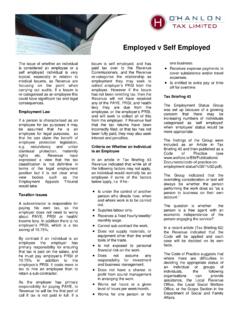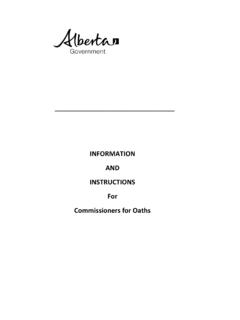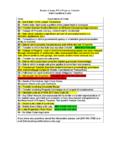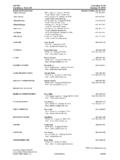Transcription of Disclaimers and Deeds of Family Arrangements - O'Hanlon Tax
1 (ii) if that person is not the spouse or direct ancestor of the intestate, as if that person had died without leaving issue." A child may decide to disclaim, assuming that the disclaimed intestate share will pass to his own children, but in practice under he will be deemed to have died without issue so the benefit will pass to the next of kin (generally his brothers and sisters). Tax Implications of Disclaimers There are no tax implications for the original beneficiary on a "pure disclaimer ", one where the beneficiary simply gives up the benefit.
2 The receiving beneficiary (who takes the disclaimed benefit) is treated for tax purposes as receiving it from the deceased. A disclaimer cannot be made in favour of a particular person. If the " disclaimer " directs that the property is to pass to a particular party it is not a pure disclaimer and the transaction is effectively a gift from the person disclaiming, with the usual stamp duty and gift tax implications being applied. disclaimer for Payment It is possible for a deed of disclaimer to be signed on the basis that the person disclaiming will receive a payment from the estate instead of an asset.
3 If the person disclaiming receives money or money's worth for a disclaimer he is taxed as if he received an inheritance of the amount paid to him from the estate, as a benefit from the deceased. Disclaimers A beneficiary who does not want to accept an inheritance can disclaim it so that the benefit passes on to the next beneficiary in line. As a disclaimer is the release of a right before it comes into possession the timing is important, and a beneficiary cannot disclaim after accepting a benefit.
4 If a beneficiary is given more than one benefit under a Will he is free to disclaim all or some of the benefits. However if he takes a single benefit he cannot disclaim part of it unless he has power to partially disclaim under the terms of the Will. One of two or more joint tenants cannot disclaim on his own though he can release his interest to the other joint tenant. A disclaimer can be withdrawn unless consideration has been paid for it; or some person has altered his position in reliance on the disclaimer . It is important to establish who will become entitled to the benefit after it is disclaimed and whether this is the effect the client wants to achieve.
5 The disclaimer of an interest under a Will accelerates subsequent interests, and an interest forming part of the residue will pass on intestacy if disclaimed. If a life interest or other limited interest is disclaimed the next interest (generally the remainder interest) falls into possession. If there is an intervening interest that interest will be accelerated. Example Property is left to A for life, then to B for life, with the remainder passing to C. If A disclaims B s life interest will be accelerated.
6 If B disclaims then C will take the property absolutely. Intestate Disclaimers can be quite complex, in terms of redirecting the assets. Succession Act 1965 provides that assets pass to the persons determined by law, and deems certain relatives not to exist. provides that:- "where the Estate, or part ..is disclaimed ..the estate or part .. shall be (i) as if the person disclaiming had died immediately before the death of the intestate, and OHT Guide Disclaimers and Deeds of Family arrangement Revenue Example 4 Patrick dies and leaves his farm valued at 350,000 to his son Robert and the residue of his estate to his daughter Sheila.
7 Robert, who has no interest in farming, decides to disclaim the bequest of the farm to him in consideration of a payment to him of 250,000 from the estate. Robert is treated as taking an inheritance of 250,000 from his father Patrick. Sheila is treated as taking an inheritance from her father Patrick of the farm and the residue of the estate, less the 250,000 passing to Robert. Deeds of Family arrangement The beneficiaries of an estate may agree to re-divide assets using a deed of Family arrangement . This is simply an agreement which is made between beneficiaries to re-distribute benefits in accordance with their wishes, out of line with the Will or rules of intestacy.
8 Tax Implications of Deeds of Family arrangement Stamp Duty may arise. Where assets pass under a Will and the legal title needs to be formally transferred a deed of Assent is signed by the Personal Representative which is not generally subject to stamp duty. However if there is a gift or sale element to the assent stamp duty will arise on the excess of the value passing over the beneficiary s entitlement under the Will or on intestacy. Two possible charges to CAT arise in respect of a deed of Family arrangement : Inheritance tax - payable on the inheritance by the original beneficiary from the deceased, and Gift tax - payable if full consideration has not been paid by the Family member receiving the property under the arrangement .
9 Unlike CGT (see below) there is no CAT relief for a deed of Family arrangement . If CAT arises and the property would appear to be eligible for relief, consideration should be given to whether the relief has any term of ownership requirement for the disponer which may prevent the relief applying on the gift element of a deed of Family arrangement . Dwelling house relief (S. 86 CATCA 03) has a 3 year ownership requirement for a gift of a dwelling, and business relief (S. 94 CATCA 03) has a 5 year ownership requirement for a gift.
10 If a gift occurs via deed of Family arrangement signed within 2 years of death neither of these reliefs would apply to the gift. A deed of Family arrangement is a disposal for CGT purposes but (6) Taxes Consolidation Act, 1997 provides a CGT exemption where a deed of Family arrangement or a similar instrument is signed within two years of the date of death which varies the way in which the property of the deceased passed under the Will or on intestacy. The two year time limit may be extended as the legislation specifically refers to a period of not more than 2 years, or such longer period as the Revenue Commissioner may by notice in writing allow.









